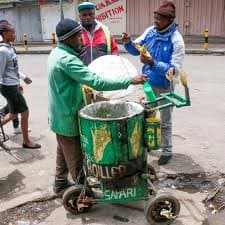We're loading the full news article for you. This includes the article content, images, author information, and related articles.
Edwin Ogembo's four-year prison sentence for a crime he maintains he did not commit sheds light on the harrowing ordeal of wrongful incarceration in Kenya and the arduous path to rebuilding a shattered life.

In 2017, Edwin Ogembo's life took a dramatic turn. A resident of Molo town in Nakuru County, he supported his young family by hawking boiled eggs. His world was turned upside down when he was arrested for the alleged theft of 50 chickens from a neighbour. Ogembo has consistently maintained his innocence, stating that the alleged crime occurred while he was at work. He believes he was framed by friends. Despite his pleas and the presence of witnesses, he was held in remand for nine months before being convicted and sentenced to four years in Naivasha Maximum Prison. The conviction was particularly devastating as his wife had recently given birth to twins just three months prior.
Ogembo describes his time in prison as a dehumanizing experience he had never imagined. The initial months were the most challenging, as he grappled with the separation from his family and the stigma of being a convict. He recounts the harsh conditions, including scarce and poor-quality food. The psychological toll of being imprisoned for a crime he insists he did not commit was immense, leaving him feeling unheard and unjustly punished.
Upon his release, Ogembo faced the daunting task of rebuilding his life from scratch. With his family's support, he relocated to Nakuru City to escape the stigma associated with his conviction in his hometown. He now sells boiled maize from a mobile boiler, earning a modest income to support his family. His story is one of resilience and the determination to move forward despite the immense challenges faced by exonerees in Kenya. These challenges often include psychiatric problems, social stigma, and difficulty finding employment.
Edwin Ogembo's case is not an isolated one. Numerous Kenyans have faced the injustice of being wrongfully convicted. For instance, Julius Wambua was imprisoned for nearly a decade after being falsely accused of defiling his daughter, a charge that was later recanted. Similarly, Daniel Wanyeki Gachoka spent 17 years in Kamiti Maximum Security Prison before his conviction for allegedly defiling his daughters was overturned after they admitted to being coerced into giving false testimony. These cases highlight several systemic issues within the Kenyan criminal justice system. According to the Kenya National Commission on Human Rights (KNCHR), misapplication of the law, lack of legal awareness for the accused, and corruption among judicial officers can lead to wrongful convictions. Furthermore, the process of appealing a conviction can be difficult for those without legal representation.
A significant hurdle for those who have been wrongfully imprisoned in Kenya is the lack of a clear and robust framework for compensation. While the Constitution provides for the right to petition for redress, the process can be long and arduous. In a recent case, a man who sought Sh5 billion for wrongful prosecution and imprisonment was awarded Sh4.2 million by the High Court, highlighting the disparity between the damages sought and the compensation awarded. There is a growing call for legal reforms to adequately address the suffering and loss endured by victims of miscarriages of justice. The Power of Mercy Advisory Committee, established in 2011, advises the president on cases of miscarriage of justice, but formidable challenges remain for those seeking to prove their innocence after conviction.
The stories of Edwin Ogembo, Julius Wambua, and Daniel Wanyeki underscore the urgent need for reforms within Kenya's criminal justice system to prevent such miscarriages of justice. These include ensuring adequate legal representation for all accused persons, combating corruption within the judiciary, and establishing a fair and accessible system for compensating the wrongfully convicted. As Ogembo continues to rebuild his life, his story serves as a powerful reminder of the human cost of a flawed justice system and the enduring strength of the human spirit in the face of profound adversity.
Keep the conversation in one place—threads here stay linked to the story and in the forums.
Sign in to start a discussion
Start a conversation about this story and keep it linked here.
Other hot threads
E-sports and Gaming Community in Kenya
Active 9 months ago
The Role of Technology in Modern Agriculture (AgriTech)
Active 9 months ago
Popular Recreational Activities Across Counties
Active 9 months ago
Investing in Youth Sports Development Programs
Active 9 months ago